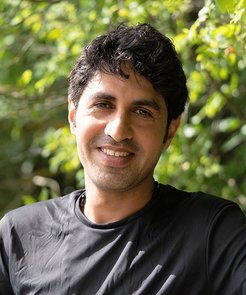Funding for research on formation of life
Vahid Nasirimarekani from the Max Planck Institute for Dynamics and Self-Organization (MPI-DS) received a two-year funding from the Klaus Tschira Boost Fund and the German Scholar Organization. In his research, he investigates the physical conditions that might have led to the formation of early life.

Most theories agree that life emerged from the oceans. However, the mechanisms of interactions of the essential biomolecules in this early phase of life are still largely unknown. With his work, Vahid Nasirimarekani from the department of Fluid Physics, Pattern Formation and Biocomplexity at the MPI-DS aims to gain new insights on where and how these processes took place. “I hypothesize that the droplets of sea water containing biomolecules landed on surfaces where the water evaporated,” he explains. “Subsequent re-hydration together with external factors such as light, heat and magnetic fields might have created the required conditions for interactions in between the macromolecules” Nasirimarekani continues.
The 2-year flexible funding will be used to hire a PhD student and to purchase the material for the planed experimental work. The setup will use experimental methods in microfluidics to generate a controlled environment.
The Klaus Tschira Boost Fund and the German Scholar Organization aim to support young careers by providing flexible funding for interdisciplinary projects. Each year, around ten excellent young researchers are selected to receive the funding. Due to connection with their peers, they get the possibility to shape their professional path and to start an independent research group.
Further information via this link.
